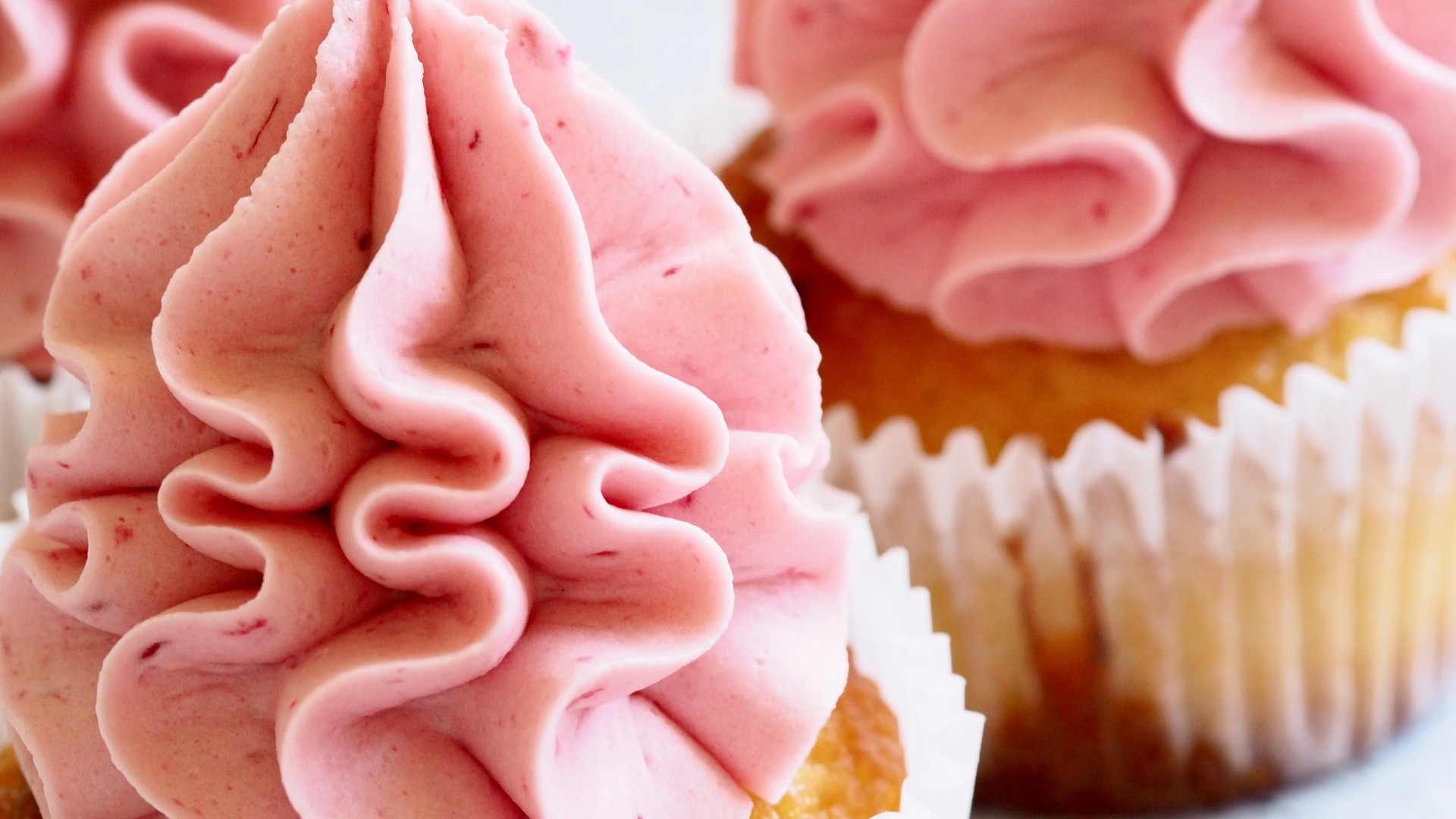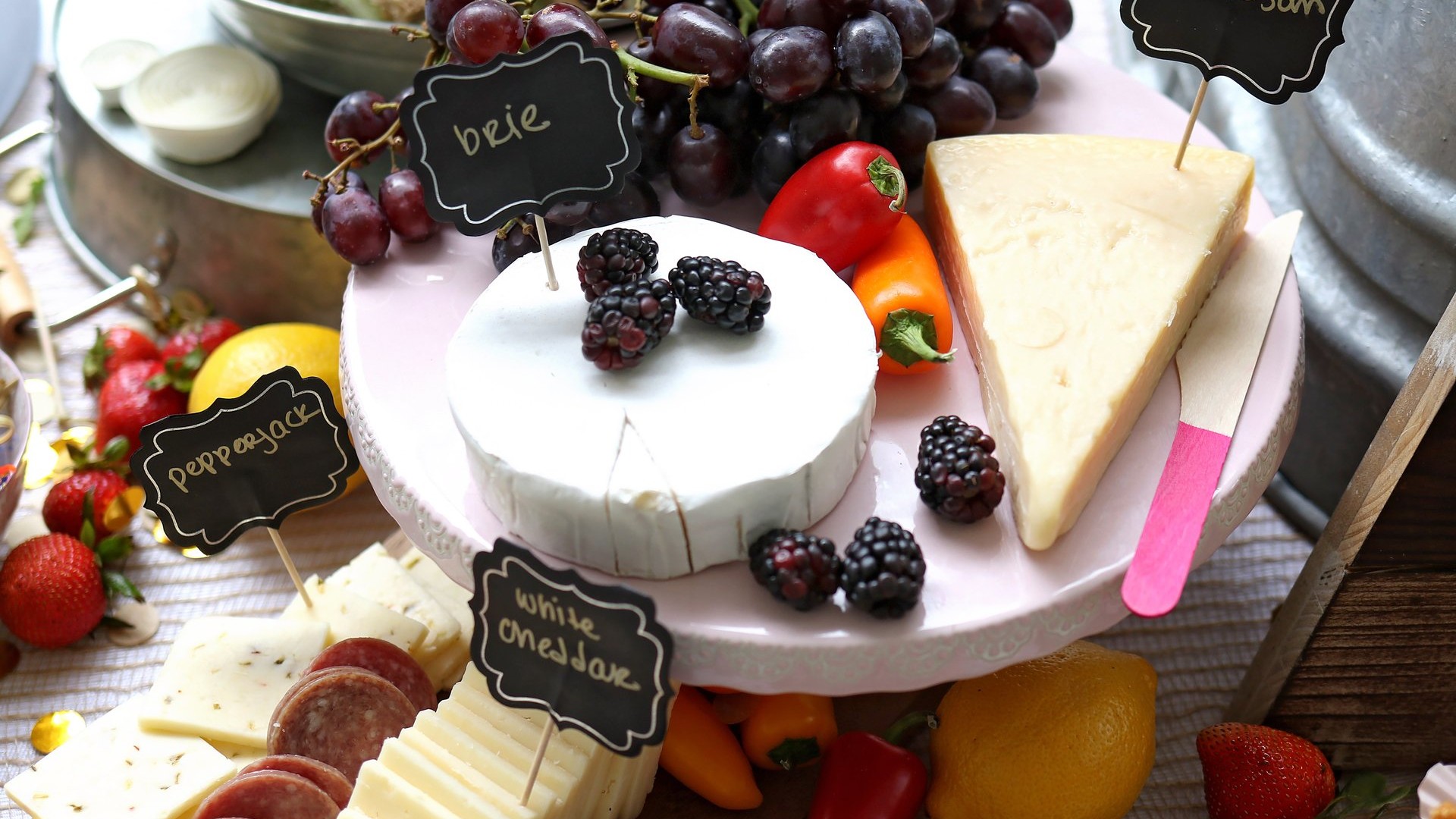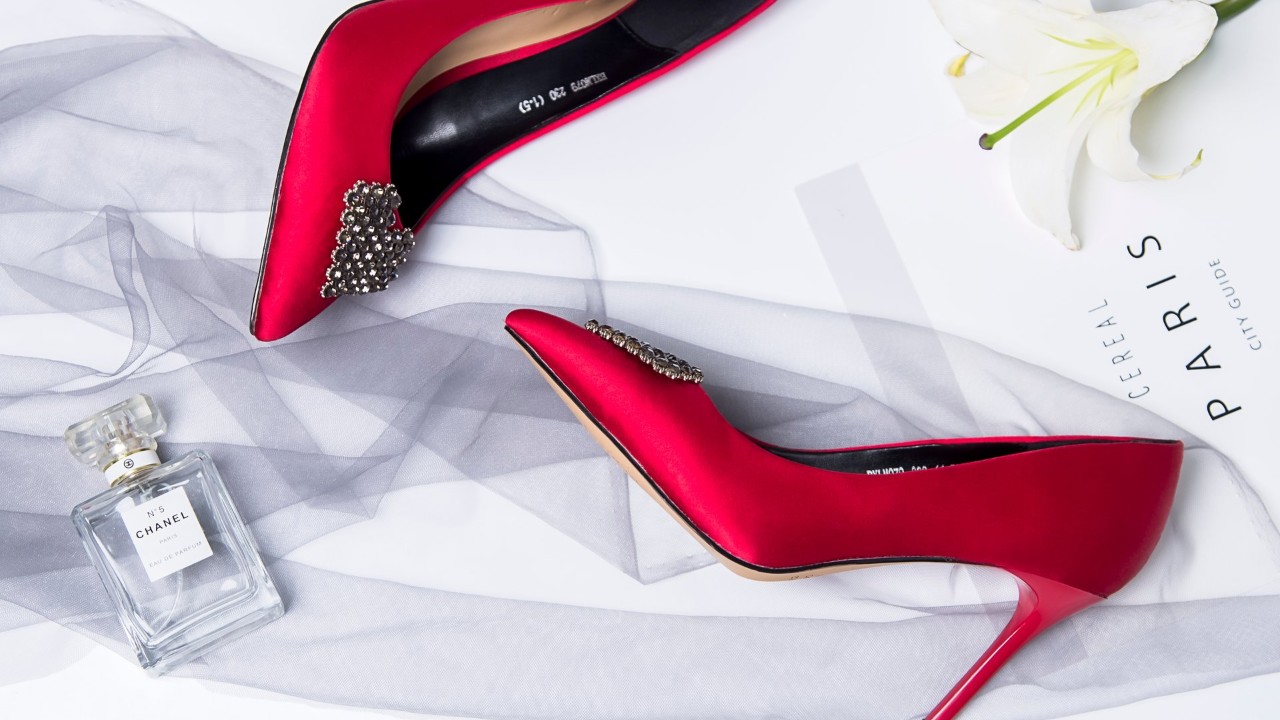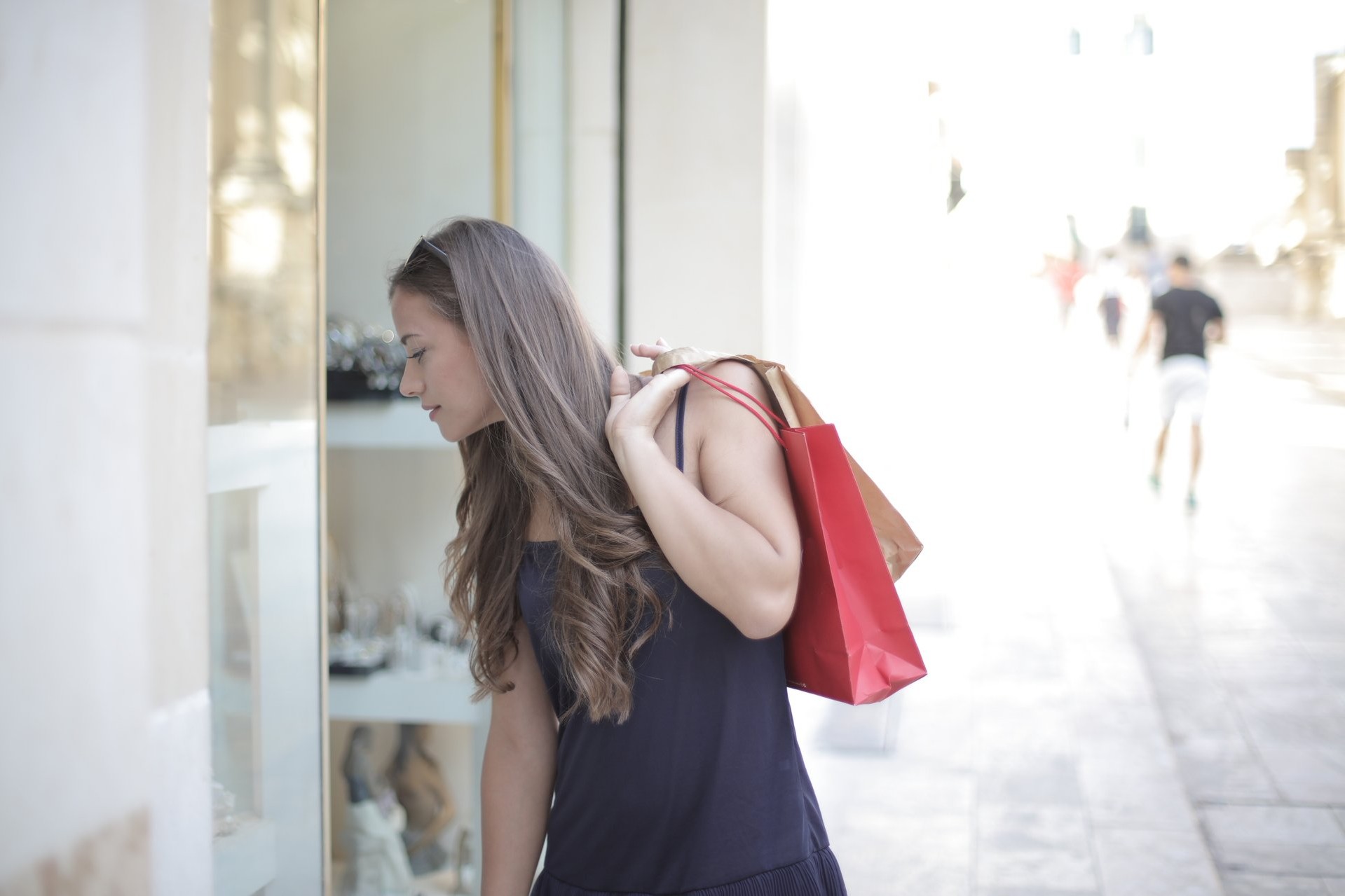I can’t really pinpoint the way I feel while staring at the assorted single-serving chilled desserts in the refrigerated section at Meinhardt.
The tiramisu, banoffee pie, and sticky toffee pudding are all equally hypnotic to me. I could stand in the aisle contemplating them for a full hour—not because I’m indecisive but because I like to imagine how all those fatty, sugary treats would taste sliding down my throat. If it didn’t mean inconveniencing innocent patrons who might actually want to purchase a cherry cheesecake rather than just observing it sweat inside a plastic capsule, I’d linger for a long time.
Instead, I keep my dessert-gazing brief.
My gaze turns similarly contemplative in expensive homeware shops or high-end malls. Just let me rifle through velvet dresses at Anthropologie or run my finger across the toe of a snakeskin boot at Nordstrom. It’s that feeling of look, don’t touch. Of this is not for you. Of want but can’t have. Of dangling forbidden fruit in my own face and then batting it away because I believe the fruit belongs to someone else—a rich woman who consumes and consumes and feels no shame. I think of her as this glamorous Pac Man; she swallows the whole world. She obeys her every desire—whether it’s born of her socialized want for more or of physical hunger. I don’t know what to make of this fantasy version of myself. Parts of her I love. Parts of her I hate.

Image by Jess Bailey/Pexels.
There’s a certain thrill in fixating on luxuries we either can’t have or deny ourselves. I’ve been thinking about that thrill a lot. Where it comes from; why we chase it. A friend of mine recently confessed to spending hours on Instagram looking at extravagant wedding dresses she can’t afford, doesn’t want to wear, and finds “fairly hideous.”
“I’ll probably never get married anyway so why am I even looking?” she asked, flopping down on the couch. It made me think her true fascination might not be with the dresses themselves but with the kinds of people who might buy one, wear it down the aisle, and spill drinks on it later. Is there a world in which she is that kind of woman? Clothing is compelling only when it’s filled with a body and a life, and if that life is an imagined version of our own—well, there’s nothing more fascinating. A wedding dress is not just a dress; it’s a window to an alternate identity.
When I was 18, I left my small town in B.C. to go to university in Montreal, where I lived in a small private dorm room because as a scholarship recipient it was apparently my right to choose solitude. I was grateful for a space in which to withdraw. Making friends was hard. I was the kind of girl who could exchange pleasantries in the hallway but not ask for a tampon. I had trouble with intimacy in nearly every type of relationship, and my poor French meant the city always felt at arm’s length. Montreal shook my hand but wouldn’t embrace me.
There was something beautiful about it—wandering around downtown, getting lost in the Plateau, never fearing an acquaintance would come up to me and ask what I planned to do with my life. Nobody in the city cared about me, and it was a wonderful relief, to breathe with anonymity. To enter a world that was not mine, and pretend I belonged. To go to a department store and shock myself with the price tag on a Gucci sandal. “$600 for this? Ha!”

Photo by Jennifer Murray/Pexels.
I particularly loved the Jean-Talon market, where I could browse the fromageries and bakeries, marvel at the number of things people put inside cheese. Walnuts. Lavender. Single-malt Scotch? It’s no wonder the French have a reputation for being snobs, I concluded, my small town brain exploding at the sight of croissants not from Tim Hortons. To cap off an afternoon I would sometimes buy a scone or an apricot Danish, but typically I regretted these tiny indulgences. There was something about withheld gratification, about restraint, that made me feel even more superior than if I’d bought everything in the market. Brushing up against a world of beautiful consumables and saying, “no, I’m fine without, thanks”—what a power move.
In one of my writing workshops, there was a girl who would eat one apple per class and it would take her the entire two hours to complete it. She would nibble off the peel and then lick the flesh, turning the apple around and around, licking and licking until finally she was ready to take another bite. It was maddening. I wanted to scream at her: just eat it! But I think about all the hours I’ve spent in markets and in shops, teasing myself with pastries and gelato, dresses and handbags, and if some omniscient being were watching me, they’d probably want to scream, too.
Maybe you’re thinking the luxury-gazing and food-gazing are not equivalent habits because one is driven by a want for things I can’t afford, while the other is driven by a want for things I’ve denied myself. There is a money barrier in one case; a mental barrier in the other. But are these barriers really that different? The society that built the money barrier is the same society that helped me build the mental one. It is the society that told me a thin body is like a ruby. People still tell me: hold onto it as long as you can. It makes me think my true fixation when I’m gazing—whether at clothes or cakes—is not just my identity but my status. How I imagine it elevated, how I imagine it destroyed. It is such a high-stakes narrative. How could I not be drawn into it, over and over?
I thought with the pandemic, with quarantine, I’d have to quit my browsing addiction and just accept my own life inside my own apartment. Just sit in myself. But the internet makes that nearly impossible. All those dewy-skinned girls slinging promo codes for summer clothes and skin serums on Instagram—they are so full of what if. Scrolling past their faces, I thrum with possibility. It hurts a little.
Granted, I can’t browse markets or high-end malls like I used to. It isn’t a pleasant experience to be inside with a thousand strangers these days. Will it ever be again? For now I’ve embraced the outdoors, turned my hungry gaze to house-hunting. Strolling past expensive homes, trying to glimpse other people’s lives through glass—I escape into a kind of beyond. It’s like dipping my toes into cool blue. The sparkling pool of another’s life—so shiny on the surface; it’s hard to look away. Has it always been?
One of the first things I learned to read as a child was the real estate section of the newspaper. I would grab it greedily from my mother and flip to the back, hoping to alight on a house that “broke the million”—a rare find in the late ’90s in my small town. Those times I found one—some Waterfront Haven, some Ranch-Style Paradise—I felt something inside me thump. It was as if there were a tiny person inside my heart: a girl the size of a Polly Pocket, throwing a tantrum in a full face of makeup. Gimme! she screamed, banging her fists. Was I supposed to listen to her?
A year or two later I made a vow to my mother: “If gas ever exceeds one dollar per litre, I will become an orthodontist.” I knew the braces business was extremely lucrative, and with the rising price of oil, I knew I would need to put finances first if I was going to have a good life. Nothing seemed more important than money.

Photo by Bella Zhong/Pexels.
My luxury-gazing doesn’t come without complicated feelings. Where is the line between escapism and compulsion? Or between harmless fantasy and unhealthy yearning? I also fear that by trying to interact with wealth, whether by popping into expensive stores or scrolling through property listings online, I’m romanticizing luxury while overlooking the inaccessibility it represents. And while I may not be able or even want to pour out my wallet to Holt Renfrew, my physical presence in its store is a way to say yes, I like what you’re doing, more please. Justifications such as “but I’m critical of it” or “it’s my way to escape” can be valid but only to a point.
Once I was caught dessert-gazing at Meinhardt. I say it like it’s a dirty thing. Like I was getting some kind of erotic thrill, when in reality I was just thinking about how the red blobs cascading down a slice of cherry cheesecake looked like the electric gloop inside a lava lamp, which made me think about my childhood, which made me miss my parents, which made me long for a former version of myself—the kid version, face covered in birthday cake, ecstatic.
But that day my friend Shaun came up behind me like a ghoul. “Hey. What are you doing here?”
It was a valid question. At the time I lived about 50 blocks away, so unless I’d come to pick up a specialty ingredient such as elderflower vinegar or white truffle pâté, there wasn’t much reason for my being there.
I opened my mouth and then closed it. I wasn’t brave enough to disclose that I treated Meinhardt like an art gallery instead of a grocery store, that my next stop would be the display case of artisan sandwiches, which I’d stroll past slowly, hands behind my back as if I were taking in a collection of preserved butterflies. And so I opted for a stuttered half-truth. “Oh, you know, just browsing, you know, I like to look at stuff, it’s sort of fun, you know, to look around…”
If I had told Shaun I’d woken up feeling sick of my apartment—the stuffy air, the jaundiced light of the kitchen, the mouse poop I’d discovered in my pants drawer—and that I’d felt the big black tarp of Regular Life pressing down upon me, and that my remedy was to pedal full speed to the grocery store so I could lose myself in a world of highly curated artisanal luxuries, well, maybe he would have empathized. He’s a poet after all.
As it turned out, he didn’t require me to give any explanation at all. “I understand,” he said. He walked past the floral arrangements and out the door, proving himself to be the kind of friend that will let you be if he senses that’s what you want. A rare and beautiful type of person.
Sometimes I think about the apple-licker and I’m overcome with awe, mainly because she showed no hint of self-consciousness while indulging her compulsion. She chewed and slurped, setting the apple down on a paper towel between her licks; meanwhile, gazes bounced off her like pebbles off a steel door. Maybe she didn’t have an eating problem at all; maybe that’s just the way she consumed food and it was fine, though I doubt it.
I remember once in Grade 12 physics someone brought in a few dozen mini confetti cupcakes to share with the class and I allowed myself one—it was so fluffy and delicious, and upon eating the last bite I wasn’t ready for it to be over. I began to scrape my teeth up and down the paper wrapper, then resorted to licking—was there a molecule left I could ingest?—hoping no one was paying too much attention to me. But somebody was. She looked at me disgustedly. “Just eat another one.” I turned pinker than the cupcake frosting and threw the slobbery paper in the trash. I rushed to the bathroom so that I could sit on the toilet for a few private minutes and contemplate what everyone probably speculated about me.
I went back to Meinhardt recently. It was June, Phase 2, and I chose to brave the line. Wearing my mask, I entered the store and floated up to the dessert fridge. There they all were: the same confections I remembered, glossy and perfect.
I wish I could say I bought one. That I ate some tiramisu in the park while watching the clouds. That would be poetic but untruthful. In reality I stared at the desserts and felt almost nothing save for a twinkle of gratitude. Stacked in their cubicles, waiting to be shuttled home, the cakes seemed frozen in time. I got the sense they would always be there—cold, sweet, waiting.
Satisfy your literary sweet tooth with more Essays.









